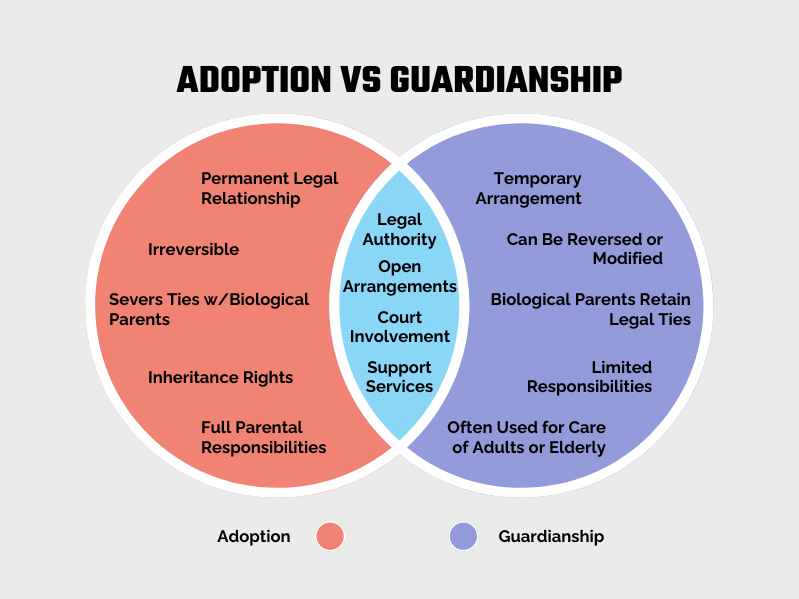
When families face the question of who will care for a child, the decisions made can reshape lives and relationships in profound ways. Whether through adoption or guardianship, the legal arrangements chosen not only reflect the current needs of a child but also anticipate their future well-being and integration into a family unit. Both options carry significant emotional and legal weight, much of which we'll discuss below.
Understanding Adoption and Guardianship
Adoption is a legal process that permanently transfers all parental rights from the biological parents to the adoptive parents. Once the adoption is finalized, the adoptive parents are the child's parents in every legal sense. The process involves several steps, including home studies to assess the suitability of the adoptive family, court proceedings to obtain legal approval, and post-adoption follow-ups in some cases. Even with a process that's very involved, there are still almost 5 million adopted children in America as of the last census.
Adoption is irreversible, meaning that once the adoptive parents assume their roles, they retain all parental responsibilities and rights as if they were the child's biological parents, including inheritance rights and the responsibility for the child's upbringing.
Guardianship, on the other hand, is a legal relationship established when a court appoints an individual (the guardian) to care for a minor whose parents are unable to care for them.
Unlike adoption, guardianship does not sever the legal relationship between the child and their biological parents. Instead, it grants the guardian certain rights over the child's care and affairs, typically until the child reaches adulthood or until the court determines that the guardianship is no longer necessary. Guardians can be responsible for the child's personal well-being, property, or both, depending on the circumstances. It should be noted that the role of a guardian is often seen as temporary and reversible, intended to provide care and stability in the absence or incapacity of the parents.
Both adoption and guardianship are bound by legal formalities and are overseen by the courts to ensure that the child's best interests are the foremost consideration. However, the path to each can vary greatly based on individual family situations, the needs of the child, and the long-term expectations of the care arrangement.

Common Grounds: Where Adoption and Guardianship Meet
Although adoption and guardianship are distinct legal processes, they share several important similarities that primarily focus on the well-being of the child. Both arrangements grant legal authority to make significant decisions concerning the child’s life, encompassing their education, health care, and general welfare. This authority enables adoptive parents and guardians to provide a safe, nurturing environment tailored to the child's needs and best interests.
Moreover, both adoption and guardianship involve a considerable level of court involvement. Courts play a crucial role in overseeing these processes to ensure that the decisions made are in the best interests of the child. This oversight includes reviewing the suitability of the adoptive parents or guardians, monitoring the placement's progress, and making necessary adjustments to the arrangement as circumstances change. The objective is always to secure a stable and supportive environment for the child, regardless of the legal path chosen.
Diverging Paths: Key Differences
While adoption and guardianship share common goals, the paths differ significantly in terms of permanence and the nature of the legal rights conferred.
Permanence: Adoption is a permanent arrangement. Once the adoption process is complete, the adoptive parents have the same legal rights as biological parents, and the relationship is intended to last a lifetime. Guardianship, by contrast, is often temporary or conditional, designed to last only as long as is necessary to serve the best interests of the child. Guardianship can be terminated by the court if it's determined that the parents can resume caring for the child or if another more permanent arrangement (such as adoption) becomes appropriate.
Parental Rights: Adoption completely severs the legal ties between the child and their biological parents, with all parental rights and responsibilities transferred to the adoptive parents. Guardianship does not sever these ties; biological parents retain their legal status, although their rights may be suspended while guardianship is in effect. This distinction is crucial for families where maintaining a legal connection to the biological parents is important.
Involvement of Biological Parents: In adoption, the involvement of biological parents after the adoption is finalized is typically limited or governed by any agreements made prior to the adoption (like open adoption arrangements). In guardianship, biological parents often continue to have some involvement in their child's life, and their rights can be fully reinstated if the court finds that the reasons for establishing guardianship have been resolved.
Roles and Responsibilities
The decision between adoption and guardianship not only changes legal titles but also assigns varied levels of responsibility and commitment to caring for a child.
Adoption imbues adoptive parents with full parenting responsibilities, akin to those of biological parents. This includes the daily care and financial responsibilities for the child, long-term educational planning, and health care decisions. Adoptive parents are also responsible for the emotional and psychological development of the child, ensuring they grow in a loving and stable environment. This permanent shift means adoptive parents are fully integrated into the child's life and rights, including inheritance rights and other legal familial benefits.
Guardianship assigns a caretaker who acts on behalf of the child’s well-being but does not assume all parental duties permanently. Guardians are responsible for the child's immediate needs and welfare but often work within the parameters set by the courts or the child’s remaining family ties. This may include managing the child’s finances, supervising their living conditions, and making day-to-day decisions that affect their well-being. However, the guardian's role is more about stewardship than complete parental replacement, and the scope can vary widely depending on the court's directions.
Making the Choice: Factors to Consider
Choosing between adoption and guardianship requires thoughtful consideration of various factors that affect both the child and the caregiver. Here are some essential aspects to keep in mind:
Duration of Responsibility: Consider how long you are able to commit to caring for the child. Adoption is a lifelong commitment and effectively makes you the child’s parent permanently. Guardianship, however, can be more temporary and may be revisited as the child's circumstances change or improve.
Child's Needs: Each child's situation and needs are unique. Some may benefit from the permanency and stability of adoption, particularly if returning to their biological family is not in their best interest. Others might need a temporary solution that guardianship provides, especially if there is a likelihood of reunification with their biological parents.
Legal and Emotional Considerations: Reflect on the legal implications and the emotional toll of each arrangement. Adoption may involve a more extensive and invasive legal process but offers greater certainty and stability once completed. Guardianship might be less intrusive initially but can involve ongoing legal oversight and potential adjustments in the future.
Family Dynamics: Consider the existing family relationships and how they might be impacted by either legal arrangement. Adoption may be more suitable in situations where maintaining biological family connections is not beneficial or desired for the child's development. Guardianship allows for those connections to remain legally recognized, which can be crucial in cases where the child's biological parents are expected to resume their parental roles eventually.
Support Systems and External Resources
Fortunately, there are various support systems and resources are available to assist families through these processes. Adoption counseling services provide invaluable support, helping families cope with emotional challenges and adjustments. These services often include preparation for the adoption process, post-adoption support, and resources for integrating an adopted child into the home effectively.
For guardians, numerous community and legal resources can offer guidance and assistance. Legal aid societies, Florida-based attorneys, and child welfare organizations provide information on fulfilling guardianship duties and understanding legal rights and responsibilities. Financial assistance programs may also be available to help guardians manage the costs associated with raising a child. Sometimes this will vary depending on the specific laws in your area.
- https://wearefamiliesrising.org/adoption-assistance/florida-adoption-assistance-program/
- https://www.myflfamilies.com/services/child-family/child-and-family-well-being/guardianship-assistance-program-gap
- https://adoptuskids.org/adoption-and-foster-care/parenting-support/support-services-by-state/florida
Navigating Challenges and Celebrating Milestones
Both adoption and guardianship come with their own set of challenges and milestones. Families may face hurdles such as navigating the legal system, dealing with emotional adjustments, and integrating new family dynamics. However, each step forward brings its own rewards and milestones.
Adoption disruptions, although rare, can occur, and families should be prepared to cope with these situations. Support groups and counselors can play a crucial role in helping everyone involved manage the emotional impact of such events.
Handling holidays and other significant family times can also pose challenges, especially soon after an adoption or during a guardianship. Planning ahead and establishing new traditions can help create that sense of family unity.











